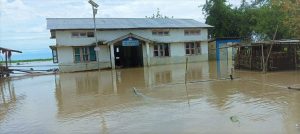A committee of the Indian parliament has urged the government to evolve a consensus among the states for implementation of an ambitious river-linking project, which was conceived more than four decades ago.
The Standing Committee on Water Resources wants the government to put in serious efforts for execution of the Inter-Linking of Rivers (ILR) scheme, which it feels would yield multiple benefits to the country.
“Considering the huge losses caused by floods every year and huge benefits accruing out of the interlinking of rivers, the Committee urge the Department [a wing of the Ministry of Water Resources] to make concerted efforts to convince the States and arrive at a national consensus so that the project of ILR becomes a reality,” the Committee said in its report.
The Committee based its conclusions on statements by officials from the ministries of water resources and external affairs, as well as the state governments of Assam and Kerala, which were spread across several sessions that began last year.
The rationale of linking rivers stems from the disparity in the availability of water in the different basins across India as a result of uneven rainfall and population density. The project would involve construction of around 15,000 kilometers of new canals and 3,000 big and small dams and storage structures.
In 1980, a National Perspective Plan (NPP) was prepared by the government for transferring water from water-surplus to water-deficit basins. Under the NPP, the National Water Development Agency (NWDA) identified 30 rivers on which feasibility reports were prepared and circulated to the concerned states.
The project, which has provoked sharp reactions from environmentalists, received a boost after the Bharatiya Janata Party-led National Democratic Alliance swept to power in 2014. The Godavari and Krishna rivers in southern India were linked two years later.
The parliamentary committee report focuses on flood management in the country and evaluates international water treaties between India and neighboring countries of China, Bhutan, and Pakistan.
It has sounded an alarm over the country’s preparedness to tackle floods and has offered a slew of recommendations for the government to implement. The members expressed concern over the figure of 40 million hectares, which was identified by the National Commission on Floods as being flood prone in 1980. The total damage to crops, houses, and public utilities from 1953 to 2018 had been estimated at over 40,000 million rupees.
The government has been advised to “rework” flood control strategies and renegotiate the Indus Water Treaty with Pakistan owing to climate change. It recommends a specific national policy to deal with the recurring problem, a robust institutional and legal structure to foster coordination among states and steps to ensure conservation of water resources.
To that effect, a proposal has also been mooted for amending the constitution for more powers to the central government to tackle floods but only after achieving a consensus among all the stakeholders.
The report underscores the danger from dams in the north-eastern border state of Arunachal Pradesh, which has been a major reason for periodic floods in the neighboring state of Assam. The warning has come close on the heels of the government firming up plans to construct more dams and reservoirs in Arunachal Pradesh to augment hydropower generation.
The report has called on the Ministry of Water Resources to make efforts for the passage of the Dam Safety Bill and the River Basin Management Bill in Parliament for optimum utilization of water resources and mitigation of floods in the country. The ministry has also been advised to discuss the issue of dams with the Ministry of Power and the Arunachal Pradesh government for an amicable solution to recurring floods.

































